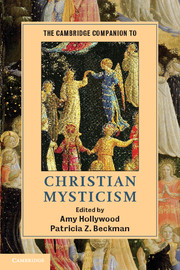Book contents
- Frontmatter
- Contents
- Contributors
- Introduction
- Part I Contexts
- 1 Early Monasticism
- 2 Song, Experience, and the Book in Benedictine Monasticism
- 3 New Forms of Religious Life in Medieval Western Europe
- 4 Early Modern Reformations
- Part II Key Terms
- Part III Contemporary Questions
- Select Bibliography of Christian Mystical Texts up to around 1750
- Select Bibliography of Modern Works Related to the Study of Western Christian Mysticism
- Author and Artist Index
- General Index
- References
2 - Song, Experience, and the Book in Benedictine Monasticism
from Part I - Contexts
Published online by Cambridge University Press: 05 December 2012
- Frontmatter
- Contents
- Contributors
- Introduction
- Part I Contexts
- 1 Early Monasticism
- 2 Song, Experience, and the Book in Benedictine Monasticism
- 3 New Forms of Religious Life in Medieval Western Europe
- 4 Early Modern Reformations
- Part II Key Terms
- Part III Contemporary Questions
- Select Bibliography of Christian Mystical Texts up to around 1750
- Select Bibliography of Modern Works Related to the Study of Western Christian Mysticism
- Author and Artist Index
- General Index
- References
Summary
The various forms of monastic life that emerged in the third and fourth centuries of the Common Era all claimed to provide the space in which the life of Christian perfection might be most effectively pursued. The monks and nuns who became the self-described spiritual elite of Christianity lived under rules that told them when, why, where, and how to act. The most successful of these rules in Western Christianity, the sixth-century Rule of Benedict, is often praised for its flexibility and moderation, yet within it every aspect of the daily lives of the monks is carefully ordered. If we understand ritual as the repeated and formalized practice of particular actions within carefully determined times and places, the moment in which what we believe ought to be the case and what is the case in the messy realm of everyday action come together, then the Benedictine’s life is one in which the monk or nun strives to make every action a ritual action.
Between 400 and 700 CE at least thirty regula, or “rules of life,” were written in Latin. All of these Latin rules were grounded in earlier attempts to legislate the form of monasticism in which men or women – and sometimes men and women together – lived in an enclosed community under the leadership of an abbot or abbess. Known as cenobitic monasticism, this way of pursuing the ideal Christian life is described and prescribed in texts associated with Pachomius in Egypt (d. ca. 346), Basil the Great in Cappadocia (d. 379), and the North African bishop, Augustine of Hippo (d. 430). But it was the Rule of Benedict, together with variants written for the use of women, that became the centerpiece of monastic life in Western Europe during the Middle Ages.
- Type
- Chapter
- Information
- The Cambridge Companion to Christian Mysticism , pp. 59 - 79Publisher: Cambridge University PressPrint publication year: 2012
References
- 4
- Cited by



